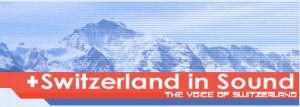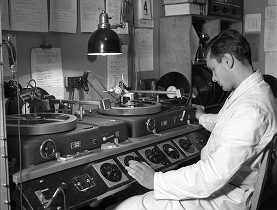During the Second World War, Switzerland’s fledgling short wave radio service was essential to its attempts to communicate its policies and actions to an external audience made up of both foreign governments and the Swiss abroad.
The archives of the Short Wave Service (SWS), founded in 1935, have been digitalised and are now available online (See link). SWS was the forerunner to Swiss Radio International (SRI) which later became swissinfo.ch.
The manuscripts of news bulletins from this dark time in Europe reveal Swiss thinking on events both out of its control and right on its doorstep as the country desperately held on to its beloved neutrality.
In Switzerland’s national languages (German, French, Italian) as well as English, Spanish and Portuguese, SWS broadcast news and analysis of military events on both sides.
It also reported on living conditions of Australian, New Zealand, South African and American POWs interned in mountain retreats, and issued sharp rebukes of external criticism of Swiss government policy.
“Switzerland finds herself today in one of the most peculiar situations of her long history. From a certain viewpoint, she is surrounded by one power only. From another viewpoint, she is surrounded, among others, by three defeated powers: Austria, France and Italy. Under these circumstances Switzerland has remained true to her traditional role of guardian of the Alpine passes,” began an English broadcast from Hermann Böschenstein in the wake of the fall of Mussolini in 1943.
The same broadcast went on to discuss dashed hopes that Italy’s fall would see a reopening of transport routes to the sea, praised the Swiss influence of the International Red Cross as “incontestable”, and noted that “all-out” training of Swiss army troops had resulted in “quite a few casualties lately” with the use of flame-throwers being responsible in some cases.
Treasure trove
Lausanne University’s François Vallotton, a specialist in contemporary audio-visual and media history in Switzerland, was unable to resist the lure of such a treasure trove of documents.
Vallotton, whose work focuses in particular on the Swiss Broadcasting Corporation (SBC) – the parent company of swissinfo.ch – convened a seminar to undertake initial research on the SWS archive documents.
The archives, which have been formatted into a database searchable by keyword, are particularly interesting for historians because the historiography of international radio services has not yet been developed, particularly in Switzerland.
Vallotton says analysis of the archives is unlikely to reinvent what is already known about Switzerland during the Second World War, but: “What is interesting is that it is a source that allows us to see the image that Switzerland wanted to present to the outside world.”
“That is something that is really new because before we examined local media which was aimed at the Swiss public.”
Broadcasts by SWS at that time were also notable for the fact that they were the first news bulletins produced by a dedicated radio editorial team; previously news bulletins had been written and read by journalists from the Swiss News Agency, a press organisation.
“The service treated events in a different manner than to the local media,” says Raphaëlle Ruppen Coutaz, who is doing his doctorate on the subject. “For historians, it’s precious because it is the only Swiss media outlet to address those abroad during the war.” [Continue reading…]
 If you were a fan of The Swiss Shortwave Merry-Go-Round, you’ll be pleased to discover the many recordings he has of The Two Bobs (Bob Zanotti and Bob Thomann).
If you were a fan of The Swiss Shortwave Merry-Go-Round, you’ll be pleased to discover the many recordings he has of The Two Bobs (Bob Zanotti and Bob Thomann).

